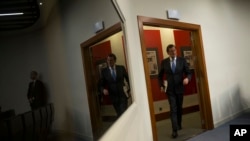Spanish voters will go to the polls again in June in a re-run of the inconclusive December election after a final round of talks between the king and political parties failed to broker a deal on forming a coalition government on Tuesday.
Acknowledging the parties' failure to break the political deadlock which emerged from the most fragmented election result in decades more than four months ago, King Felipe said he would not propose any new candidate for Prime Minister, thus paving the way for the new vote on June 26.
The December vote ended domination by the PP and Socialists stretching back to soon after dictator Francisco Franco's death in 1975 as Podemos ("We Can") and fellow newcomer Ciudadanos ("Citizens") tapped widespread anger over a recently-ended economic slump and high-level corruption.
The ruling People's Party (PP) of Prime Minister Mariano Rajoy then won 123 seats in the 350-seat lower house of parliament while the Socialists took 90, anti-austerity Podemos 69 and liberal Ciudadanos 40.
But the election also showed Spain was ill-prepared for a new era of coalition politics as no leader came even close to securing a parliamentary majority during many weeks of talks which analysts said had more to see with a new election campaign than a real attempt to forge alliances.
Echoing this view, party leaders on Tuesday blamed each other for the impasse that may start taking its toll on the European Union's fifth-biggest economy more noticeably if Spain remains without a government for many more months.
"The day after the elections, I made an offer. The best option was an agreement between the PP and the Socialists. It was obvious that in order to form a government we had to pact," acting Prime Minister Mariano Rajoy told journalists after he met with the king. "But the Socialists did not even want to talk."
Four-way impasse
Socialist leader Pedro Sanchez said Rajoy, as well as Podemos' secretary general Pablo Iglesias, were mostly responsible for the first election repeat in Spain's modern history.
"In my opinion, Mr. Iglesias never wanted to pact with the Socialist party. Spanish politics has suffered a double blockade, from Mr. Rajoy and from Mr. Iglesias," Sanchez said.
Meanwhile, Podemos said a left-wing coalition could have been made possible if Sanchez had not set conditions other parties could not accept.
Iglesias, however, said he would still try to form an alliance with the Socialists if a new election took place, although they would have to bury their disagreements over fundamental issues including economic policy and the degree of autonomy to grant Catalonia.
Opinion polls suggest a new vote, expected to take place on June 26, would do little to resolve the current deadlock.
Although several recent surveys showed the PP and Ciudadanos could make gains in a new vote in June while the Socialists would remain broadly stable and Podemos would suffer small losses, a new four-way impasse remains the most likely scenario.
The election is due to be formally called on May 3 once the formal deadline to form a government expires on May 2, but now that the king has said he would not put forward a new candidate to seek the confidence of the parliament, it is technically impossible to hold such a vote in time.










